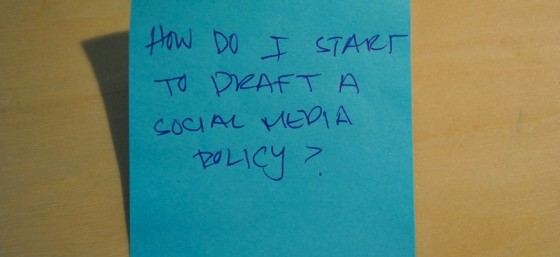Does your company handbook have a social media policy in it? And I mean a policy that talks about what you can and can’t say on your social media accounts. I don’t mean the policy that a lot of employers have about not being on Facebook and Twitter during company time or on company computers.
Seriously, go check. I’ll wait.
If you don’t have one, don’t feel bad. About a year ago 76% of companies didn’t have a social media policy. That’s disturbing. I’m surprised when I meet someone who isn’t involved in some type of social media. It’s staggering that employers haven’t kept up with the times.
People visit this site all the time looking for information about what their employers can and can’t do regarding social media – Can my employer require me to promote them with my personal Facebook account? (No.) Can my employer control my Facebook? (No.) Can my employer require me to delete my social media account? (No.) Can my employer print my Facebook pictures? (Yes.) Can I be fired for how I spend my personal time? (Maybe.) Can my employer monitor my personal Facebook page? (If it’s public, yes.)
That’s just a handful of the questions I’ve gotten in the last month.
The issue is clear – If your employer doesn’t have a social media policy, ask for one. And tell them they better check the latest report from the NLRB before they write it.
Left to their own devices, most employers will write a social media policy that says you have to promote the company with your personal accounts and/or you can’t say anything negative about the company online. Both of these provisions are illegal. The former violates Facebook’s terms of service; the later violates the NLRA.
What’s the NLRA? It stands for National Labor Relations Act. It protects employees’ abilities to talk amongst themselves about things like wages and work conditions. You’re allowed to do it publicly (even on the internet) and you don’t have to be respectful about it. If you’re ever fired for something you did on your social media account and you think it was protected by the NLRA, you can file a complaint with your employer with the National Labor Relations Board (NLRB). In the worst-case scenario, your employer will be required to give you back pay, pay you damages, and offer you your job back.
My lawyer friend who litigates these cases recently told me that $10,000 was a low amount that an employer would be ordered to pay in these situations if they fired someone for a reason that violated the NLRA.
I tell every employer that they need a social media policy that provides a list of dos and don’ts for employees. I also tell them to hire an attorney to write the policy for them to ensure that it complies with the NLRA. Then I tell them to at least have their attorney review it every 6 months. The NLRB regularly publishes new reports based on their cases so the policy that was valid when it was written may be invalid now.
This is one of those times when you can’t just download a social media policy template and call it good. This area of law is changing too often.
It’s better to pay a chunk of money now to have someone write your social media policy than to have to pay $10,000+ in back pay, damages, attorneys’ fees, plus whatever it costs for your headache and stomach pain medication to treat the stress of dealing with an NLRB investigation. This is a problem a lot of employers don’t realize they have until it’s too late, and it doesn’t have to be. Call an attorney who understands social media and the NLRB to draft your policy for you.
If this was TL:DR, I made a video. You can watch it below or here.
You can connect with me via Twitter, Google+, Facebook, YouTube, and LinkedIn, or you can email me.
Please visit my homepage for more information about Carter Law Firm.
